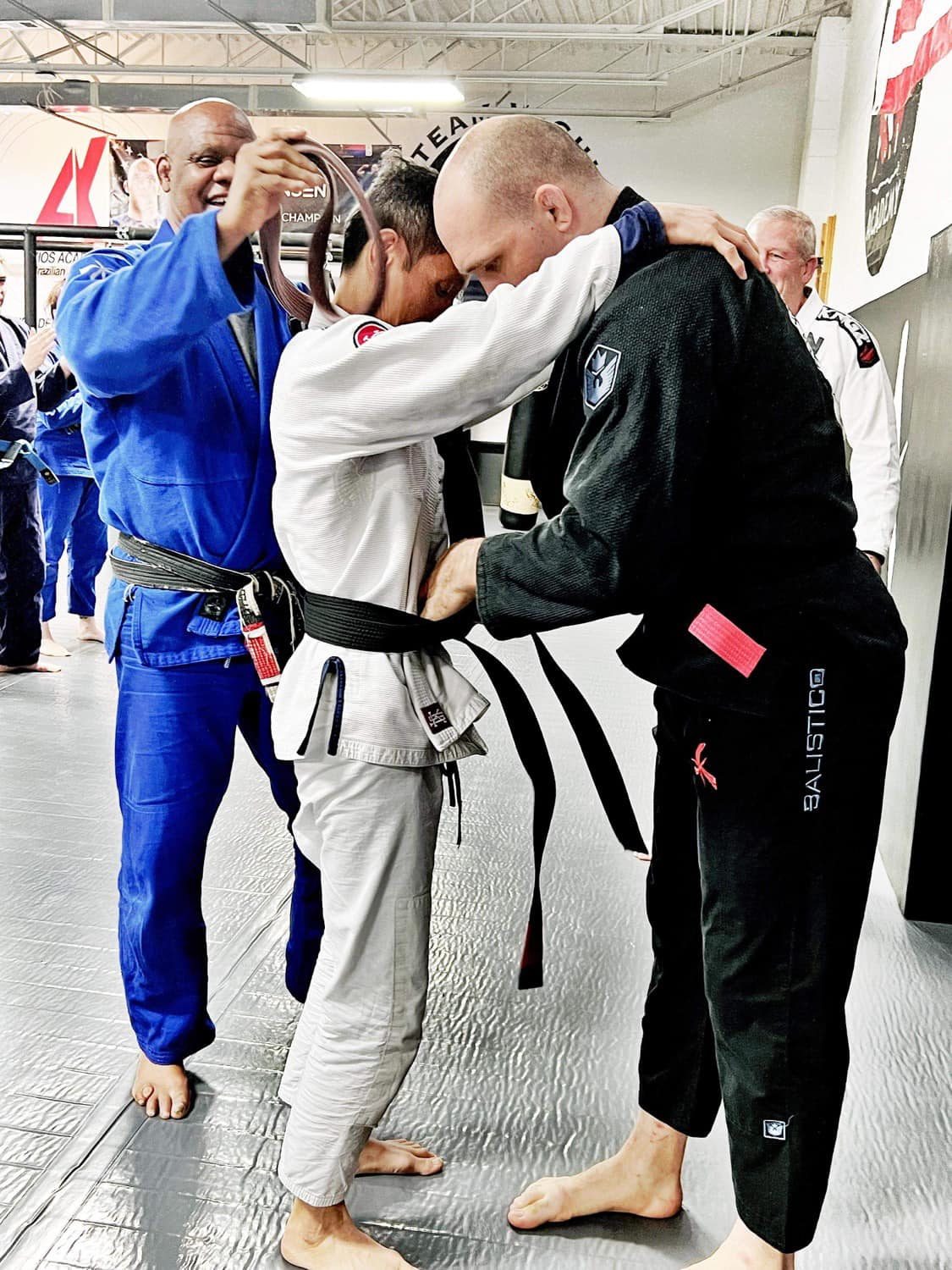For one priest and professor of theology, jiu-jitsu is more than just a hobby or sport — it is a philosophy that reminds him of humility and betters his teaching.
Associate professor the Rev. Peter Nguyen, S.J., has been practicing jiu-jitsu for 22 years and earned his black belt on March 14 at Axios Academy in Omaha under John Hansen.
“When I started jiu-jitsu back in 2001, it was never about the black belt,” Nguyen said via Zoom from Cologne, Germany, where he is working on research. “It was about learning something new, being passionate about it and making friends on the mats. I’m grateful for the black belt, but that’s not the reason why I do jiu-jitsu.”
Nguyen said he believes that jiu-jitsu is a way to practice philosophy.
“The starting point of philosophy, arguably speaking, is knowing your weakness or knowing what you do not know. And so, these past 22 years, every time I get submitted, every time I get tossed on the ground, every time I get pinned, it’s a chance for me to do philosophy,” Nguyen said. “Not just in my head per se, but both in my head, my spirit and my body. It’s an embodied way of doing philosophy.”
This philosophy of jiu-jitsu has greatly impacted Nguyen’s life. He said the sport requires hard work and discipline, especially during competition season when he often works out for 12-16 hours a week over the course of five to six days. While all this practice does take time, Nguyen has realized that having practice in his schedule is helpful because he is a self-described “creature of habit.”
“Because it [jiu-jitsu] is part of my routine, part of my habit, it also makes me more productive as a teacher in the classroom, as a scholar and as a priest,” Nguyen said.
Jiu-jitsu has also taught Nguyen how to take risks, which is a lesson he uses to be a better professor. He has had both coaches he thought were great and coaches that he thought were bad. It’s the coaches who were passionate about their jiu-jitsu and exploring new ways of doing jiu-jitsu that he liked the most, so he tries to emulate this in his teaching by showing his passion for his faith and by not playing it safe.
“Teaching philosophy and theology is to teach a man and woman how to live. And how to live means you’re going to make mistakes, you’re going to fall,” he said. “[I take] risks in the classroom by putting forth questions and challenges, as opposed to just merely giving you a list of dates and a list of terms to memorize. That is playing it safe. So, jiu-jitsu has taught me how to make mistakes and learn how to fail. I apply that to the classroom.”
Falling is a recurring mistake that Nguyen has made, but he is grateful that jiu-jitsu has taught him how to fall properly both on and off the mats. When he falls, whether it is physically or spiritually, it is a chance for him to learn how to get up and to learn about his own weaknesses.
“It’s humility. I’m human, I’m mortal; I will fall. Falling is not the end of the world; it’s always an occasion to get up and learn from your mistakes,” Nguyen said.
Currently, Nguyen is in Cologne, Germany researching St. Edith Stein, a Carmelite nun and philosopher who was martyred in Auschwitz during WWII. He is sorting through her notes to read and translate them. His work focuses on her notes from 1932 about an anthropology course she was going to teach in 1933 to aspiring female teachers about what it means to be a man and woman from the perspective of faith. That course was never taught because Stein, who was raised Jewish before converting to Catholicism, was removed from her teaching position in Germany due to her Jewish ancestry.
Ngyuen’s goal is to look into Stein’s beliefs on individuality. “When I was in Rome last summer I met up with a Carmelite priest,” Nguyen said. “He said to me, ‘Look at her writings on individuality when she was teaching at an all-girls high school and when she was teaching aspiring teachers.’ I said, ‘why individuality?’ And he said to me, ‘you want to write on Stein in the context of fascism. What is one of the hallmarks of fascism or communism or any totalitarian? The individual person does not count. It’s the collective, it’s the state. It’s a perverse or distorted notion of the common good.’ And so here I am, looking at her writings on the meaning of the individual person amid all the craziness of 1930’s Germany.”
Nguyen will return to Omaha in mid-May.
Like jiu-jitsu, this research project is important to Nguyen. “It gives me life,” he said.
